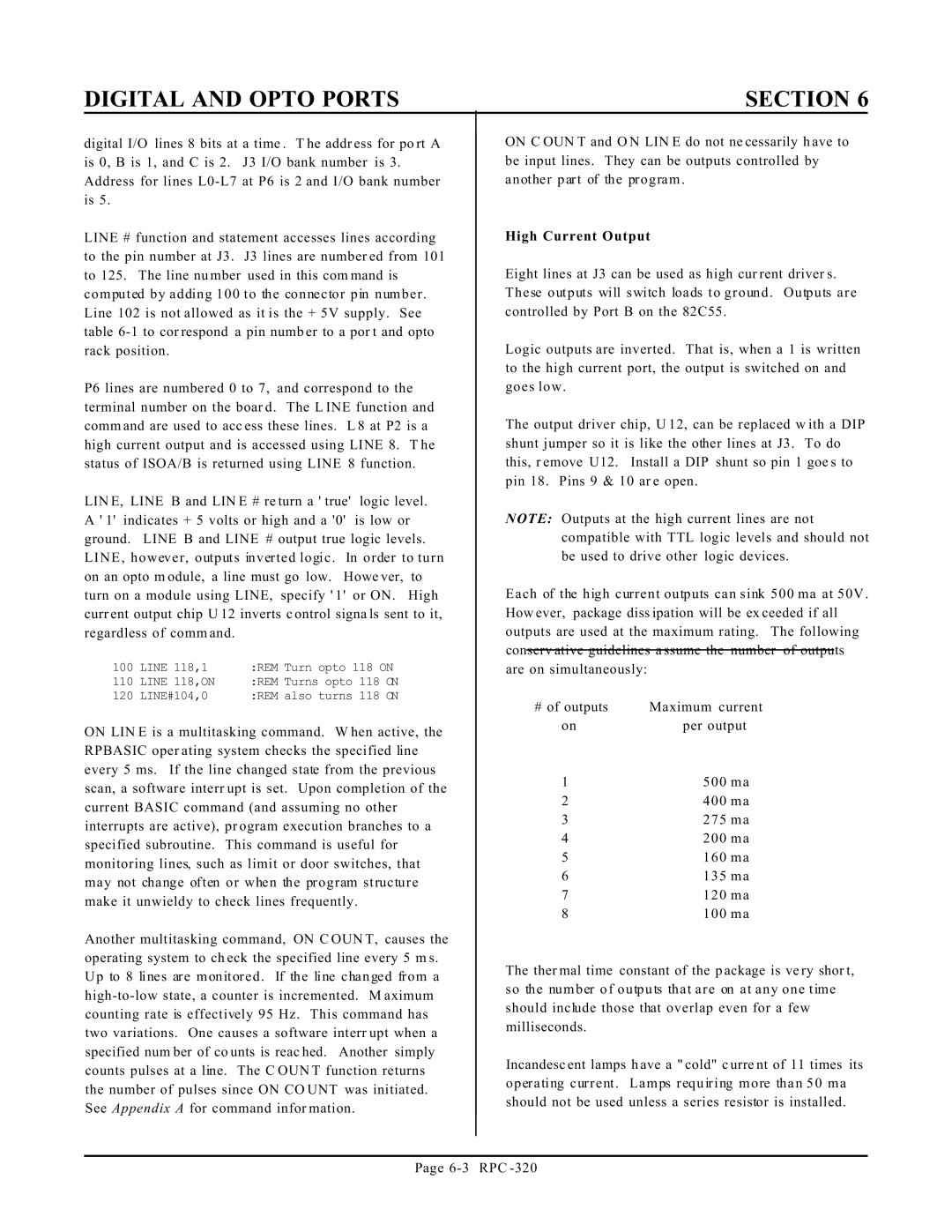
DIGITAL AND OPTO PORTS
digital I/O lines 8 bits at a time . T he addr ess for po rt A is 0, B is 1, and C is 2. J3 I/O bank number is 3. Address for lines
LINE # function and statement accesses lines according to the pin number at J3. J3 lines are number ed from 101 to 125. The line nu mber used in this com mand is computed by adding 100 to the connector pin number . Line 102 is not allowed as it is the + 5V supply. See table
P6 lines are numbered 0 to 7, and correspond to the terminal number on the boar d. The L INE function and comm and are used to acc ess these lines. L 8 at P2 is a high current output and is accessed using LINE 8. T he status of ISOA/B is returned using LINE 8 function.
LIN E, LINE B and LIN E # re turn a ' true' logic level.
A ' 1' indicates + 5 volts or high and a '0' is low or ground. LINE B and LINE # output true logic levels.
LINE, however, outputs inverted logic . In order to turn
on an opto m odule, a line must go low. Howe ver, to turn on a module using LINE, specify ' 1' or ON. High
curr ent output chip U 12 inverts c ontrol signa ls sent to it, regardless of comm and.
100 | LINE 118,1 | :REM Turn opto 118 ON | ||
110 | LINE 118,ON | :REM Turns opto | 118 | ON |
120 | LINE#104,0 | :REM also turns | 118 | ON |
ON LIN E is a multitasking command. W hen active, the RPBASIC oper ating system checks the specified line every 5 ms. If the line changed state from the previous scan, a software interr upt is set. Upon completion of the current BASIC command (and assuming no other interrupts are active), pr ogram execution branches to a specified subroutine. This command is useful for monitoring lines, such as limit or door switches, that may not change often or when the program structure make it unwieldy to check lines frequently.
Another multitasking command, ON C OUN T, causes the operating system to ch eck the specified line every 5 m s. Up to 8 lines are monitored . If the line changed from a
SECTION 6
ON C OUN T and O N LIN E do not ne cessarily h ave to be input lines. They can be outputs controlled by another part of the program .
High Current Output
Eight lines at J3 can be used as high cur rent driver s. These outputs will switch loads to ground . Outputs are controlled by Port B on the 82C55.
Logic outputs are inverted. That is, when a 1 is written to the high current port, the output is switched on and goes low.
The output driver chip, U 12, can be replaced w ith a DIP shunt jumper so it is like the other lines at J3. To do this, r emove U12. Install a DIP shunt so pin 1 goe s to pin 18. Pins 9 & 10 ar e open.
NOTE: Outputs at the high current lines are not compatible with TTL logic levels and should not be used to drive other logic devices.
Each of the high current outputs can sink 500 ma at 50V. How ever, package diss ipation will be ex ceeded if all outputs are used at the maximum rating. The following conserv ative guidelines a ssume the number of outputs are on simultaneously:
# of outputs | Maximum current |
on | per output |
1 | 500 ma |
2 | 400 ma |
3 | 275 ma |
4 | 200 ma |
5 | 160 ma |
6 | 135 ma |
7 | 120 ma |
8 | 100 ma |
The ther mal time constant of the p ackage is ve ry shor t, so the number of outputs that are on at any one time should include those that overlap even for a few milliseconds.
Incandesc ent lamps h ave a " cold" c urre nt of 11 times its operating current . Lamps requiring more than 50 ma should not be used unless a series resistor is installed.
Page
